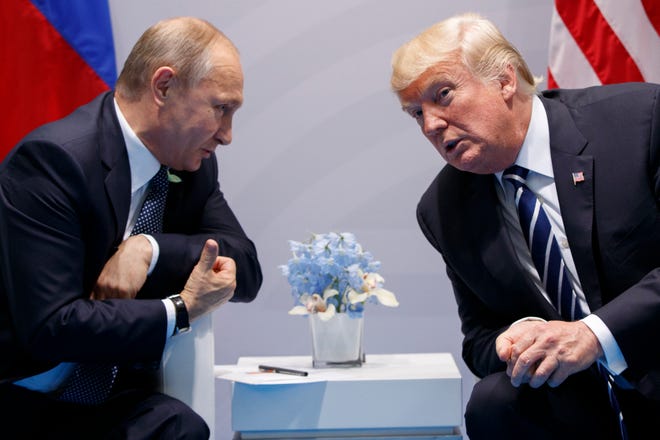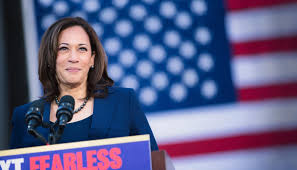As Americans reflect on the threat of Russia – or China or Iran or other U.S. adversaries – wading into November’s contest between President Donald Trump and his Democratic challenger Joe Biden, a new book delivers the score on election interference since the end of the World War II.
The United States has messed with more than twice as many elections as Russia/Soviet Union, according to “Meddling in the Ballot Box: The Causes and Effects of Partisan Electoral Interventions,” out Sept. 7. The book by Dov H. Levin, a political scientist at the University of Hong Kong, claims to be the first in-depth analysis of electoral interventions “from the dawn of the modern era to the 2016 Russian intervention in the U.S. election.”
USA TODAY corresponded with Levin about his book. The following Q&A is a lightly edited version of this correspondence.

Q: How concerned should Americans be about meddling this November?
Levin: Americans have good reason to be seriously concerned with such interference. My research finds that such meddling matters and can potentially determine the election result in 2020, as it is very likely to have done many times in the past both in the U.S. and elsewhere. My research can give two further insights in this regard.
First, the impact of covert electoral interventions on the result can be reduced by exposing meddling attempts to the general public before the vote. Accordingly, U.S. intelligence agencies should be far more forthcoming now about any highly credible evidence they have in their possession about covert Russian interference.
(There was a warning in August that there is some evidence Russia is intervening covertly in the 2020 election and recent credible media reports from ABC News and others revealed that the Trump administration is preventing U.S. intelligence agencies from divulging all they know about Russian interference attempts.)
Facebook: New political ads banned the week before the presidential election
Second, domestic mail-in ballots have never been used by a foreign power to intervene in a foreign election – probably due to the great difficulty of forging a sufficiently large number of such ballots without getting caught. So there is little reason for Americans to worry, as President Trump and others have claimed they should, that any expanded use of mail-in ballots due to COVID-19 will create a dangerous opening for interference by a foreign power. Similarly, there’s no reason for any U.S. state to try to reduce the availability of mail-in ballots to try to prevent such a highly implausible possibility.
Vote by mail?:Democratic group warns Trump may declare victory even if he’s losing
Trump:North Carolina voters should test mail-in system by trying to vote twice (which is illegal)
Q: Why does election meddling happen?
Levin: It usually occurs when two conditions exist at the same time. The first condition is a foreign power feels deeply threatened by a candidate or party contesting an election with very divergent preferences than its own. The second condition is a different local actor in that country agrees to collude with the intervener in such meddling. In other words, this local actors agrees to provide the intervener with political information the intervener needs in order to have a chance in succeeding in such activity.
Electoral interventions have occurred in the elections of at least 60 different countries of all sizes and populations.
My research found that given the overall number of national elections in each region since 1946, the U.S. has been a bit more likely to intervene in elections in Asia, while Russia (or the Soviet Union) has been more likely to meddle in European elections.
Who’s going to derail the U.S. election:The culprit may be close to home
Q: What are most commons tactics used by meddlers?
Levin: By far it is the provision of campaign funding to the preferred side – in a few cases literally provided by the intervener in big bags or suitcases in scenes similar to those one sees in a movie about the mafia. Other common methods include, for example: pre-election threats or promises by an official representative of the intervening government; training party operatives of the preferred side in advanced campaigning and voter-mobilization techniques; or sudden pre-election aid cutoffs or major economic or other political concessions or promises/threats to the targeted country.
The type of meddling methods used by Russia against the U.S. in the 2016 presidential election (hacked emails, targeted misinformation) – what I call dirty tricks – are the third most common techniques used for this purpose by foreign powers.
Q: How does meddling affect the outcomes of elections?
Levin: It is usually quite effective in its goal of determining the results. My research finds, for example, that electoral interventions increase on average the vote share of the side aided by the foreign power by 3%. Such interference leads to an even larger increase if the meddling is done by the intervener in public (for example, via a pre-election threat to harm the target if the “wrong side” is elected).
I estimate that in many cases the boost from the foreign meddler was enough to determine the election results in favor of the assisted party or candidate. For example, I estimate the U.S.’s 2000 intervention in the elections in then-Yugoslavia on the side of the Serbian opposition played a key role in Slobodan Milosevic’s defeat in those elections. The U.S. intervention helped lead to an end of a decade of human rights abuses and armed conflicts in the Balkans that Milosevic played a key role in instigating and extending.
Q: Which country is the biggest election meddler?
Levin: The U.S. has intervened in the most elections between 1946 to 2000: 81 elections in total, followed by the Soviet Union/Russia with 36 examples of interference. Other countries, such as Iran since 1979, Libya under former dictator Muammar Gaddafi and Venezuela under the late authoritarian leader Hugo Chavez are known to have also to have occasionally intervened in elections.
Q: Which country is the top target for meddlers? Why?

Levin: Italy has been the top target of election interference with 12 cases of interference since 1946 – most of them (8) by the U.S. Italy’s position as a top target of such meddling is due to a combination of two factors. First, the U.S. was very afraid during the Cold War that an election victory by the Italian communist party, which was closely affiliated with the Soviet Union during much of this era, would lead Italy to exit NATO and eventually join the communist bloc, leading to a major setback for the U.S. in its struggle with the Soviets. Second, unlike the case of many other communist parties in other democracies, the Italian communist party didn’t experience a decline in its domestic popularity as the Cold War progressed and remained a strong political force that came very close to winning multiple Italian elections. That is despite the communist party’s de facto exclusion from power since 1947. At the same time, the main ruling party during this period, the Italian Christian Democrats, repeatedly asked the U.S. to intervene on its behalf because it suffered from several enduring political weaknesses.


